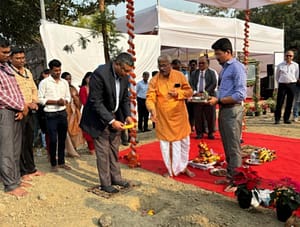Shri Srinivas Katikithala, Secretary, Ministry of Housing and Urban Affairs (MoHUA) chaired the first meeting of the CSMC under PMAY-U 2.0 on 20th March 2025.
Proposals for construction of over 3.53 lakh houses have been approved at the meeting of Central Sanctioning and Monitoring Committee (CSMC) under Pradhan Mantri Awas Yojana – Urban 2.0 (PMAY-U 2.0) on 20th March 2025.
A total of 3,52,915 lakh houses under Beneficiary Led Construction (BLC) and Affordable Housing in Partnership (AHP) components of PMAY-U 2.0 in 10 States/UTs, namely Andhra Pradesh, Arunachal Pradesh, Bihar, Haryana, Jammu & Kashmir, Odisha, Puducherry, Rajasthan, Telangana, Uttar Pradesh has been sanctioned today.
The Scheme promotes women empowerment and among the houses approved on 20 March 2025 under PMAY-U 2.0, more than 2.67 lakh houses have been sanctioned for the women alone, including single women and widows along with 90 houses have been allotted to Transgenders. Out of the total sanctioned houses, 80,850 houses for SC beneficiaries, 15,928 for ST and 2,12,603 for the OBC category have been sanctioned, promoting inclusiveness and equality among different underprivileged groups.
Interestingly, in addition to the State share under PMAY-U 2.0, State Govt. of Uttar Pradesh is providing Rs. 30,000 to each senior citizen beneficiaries (who are more than 70-year-old) and ₹ 20,000 for each unmarried women (more than 40 years age), widow and separated female beneficiary.
PMAY-U 2.0 is currently in the implementation phase with MoAs signed between the Ministry and 31 States/UTs. MoUs have also been signed between the Ministry and Central Nodal Agencies (CNAs) for implementation of the scheme. In addition, MoUs with more than 200 Primary Lending institutions have been signed with CNAs. A dedicated web portal has been developed by the Ministry to help beneficiaries apply for the scheme directly: https://pmaymis.gov.in/PMAYMIS2_2024/PmayDefault.aspx.
MoHUA has launched PMAY-U 2.0 ‘Housing for All’ Mission with effect from 01.09.2024 for implementation in urban areas across the country for 1 crore additional eligible beneficiaries. In pursuance to the Hon’ble Prime Minister’s vision of Housing for All, PMAY-U 2.0, will address the housing needs of 1 crore urban poor and middle-class families in 5 years, ensuring that every citizen leads a better quality of life.
PMAY-U 2.0 is being implemented through four verticals – Beneficiary Led Construction (BLC), Affordable Housing in Partnership (AHP), Affordable Rental Housing (ARH) and Interest Subsidy Scheme (ISS). Eligible beneficiaries can avail benefits under any one vertical as per their choice and eligibility. Government Assistance of ₹2.30 lakh crore will be provided under the Scheme with an investment of ₹10 lakh crore. Families belonging to EWS/LIG/MIG segments, having no pucca house anywhere in the country, are eligible to purchase or construct a house under PMAY-U 2.0. Central Assistance of ₹2.50 lakh per housing unit is provided.
Shri Kuldip Narayan, Joint Secretary & Mission Director (JS&MD), Housing for All (HFA), Principal Secretaries from States/UTs, State/UT Mission Directors, senior officials of the Ministry and officers from States/UTs were also present via physical and virtual modes.
Pradhan Mantri Awas Yojana – Urban was first launched in June 2015. Under the Scheme, 118.64 Lakh houses have been sanctioned while about 92 lakh houses have already been constructed and delivered to beneficiaries.
PMAY-U 2.0 ensure equity across different segments of population by addressing the housing requirements of slum dwellers, SC/STs, minorities, widows, Persons with Disabilities and other underprivileged sections of the society. Special focus will be given to Safai Karmi, street vendors identified under PMSVANidhi Scheme and different artisans under Pradhan Mantri-Vishwakarma Scheme, anganwadi workers, building and other construction workers, residents of slums/chawls and other groups identified during the operation of Scheme.











 Shri Modi also paid floral tributes to the statue and took a walkthrough of the photo gallery.
Shri Modi also paid floral tributes to the statue and took a walkthrough of the photo gallery.